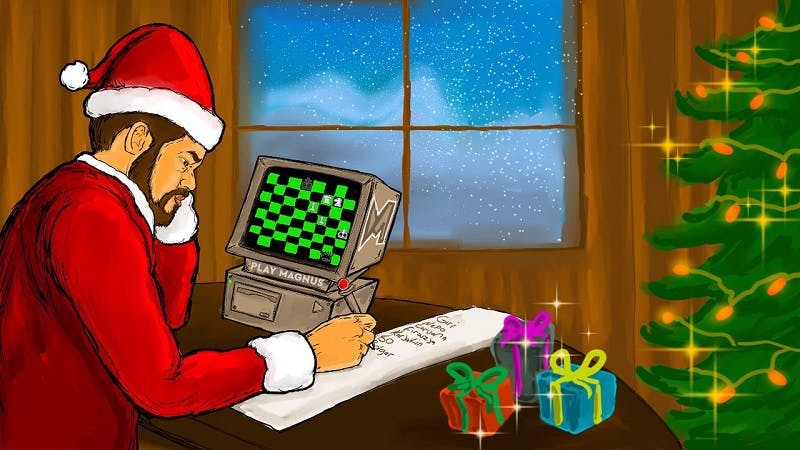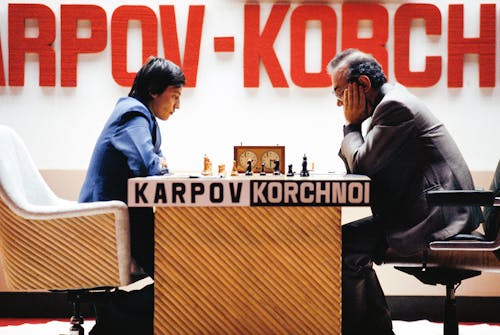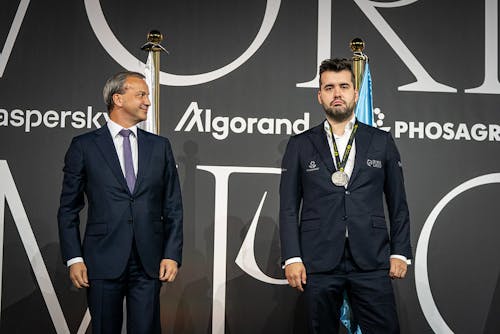Are you sure you want to delete your account?
(This will permanently delete all of your data - purchases, game scores, ratings, etc)
Change your username
Your current username is: guest
Change your account email address
Your current account email is:
Redeem your Fampay code here!
Use your Fampay code to get access to the Play Magnus Plus Membership!

What are Your New Year’s Chess Resolutions?
Are you preparing for the New Year’s Eve celebrations? I definitely am!
As a control freak, I allocate a decent amount of time to planning what my goals and tasks will be for the foreseeable future. Here is a summary of how I keep track of everything:
· I used to have a document where I wrote down my key long-term goals, answering the question, “Where are you going to be in five years?”. However, it didn’t work out particularly well for me. Maybe I lack focus, or perhaps my life is too diverse. Also, the pace of life tends to speed up, and there are all sorts of black swans flying around. For instance, imagine many of your plans getting shattered by COVID? Anyway, I try to foresee the future, but my focus is on what will happen over the next year.
· Yearly planning. Every year, I create a document covering the main areas of my life. Namely, “Health and beauty”, “Personal relationships”, “Career”, “Finances”, “Literature”, “Chess”, “Reading and movies”, “Household affairs”. Within each category, I write down the most important projects. If possible, I also mention the next step and the deadline for it.
· Monthly planning. For this, I have a nice-looking whiteboard. I use a marker to jot down 3-5 main goals for the current month. When working at my home office, I see this whiteboard all the time, and it reminds me of my priorities (“Come on, you are supposed to finish writing a fantasy book, so close that YouTube tab already!”)
· Weekly planning. I prefer using an old-fashioned yearbook, writing down the key tasks for each day. I guess we have all heard stories about mega-productive guys like Elon Musk, who allegedly use every minute of their time efficiently. This doesn’t seem to work for me, though, because I tend to get burnt out and frustrated if I am under too much stress. Hence once I am done with my main objectives for the day, I either assign myself more tasks or relax whatever way I like. Why not do the planning on a laptop/smartphone? The truth is, I spend most of my time staring at screens anyway. Also, I love writing something with my hand. It gives a great, magical feel.
· Daily planning. Since some tasks are not associated with specific days and can be done more or less anytime you want, I write them out on a special sheet or post-it notes. My gamer background is handy because I am used to grinding dailies that can sometimes be quite tedious to complete. A way to make the process more entertaining is to put the post-it notes in a sack and draw two or three of them per day. This way, you will make sure that these pending tasks don’t get postponed over and over again as it often happens.
This was a long introduction! Now let’s get to chess. As you can see, it plays a prominent role in my life and hence deserves a separate category on the yearly plan. It could be the same for you, or you could place it in the “Hobbies” tab. However, what is more important is WHAT you write inside the tab.
When making chess New Year resolutions, try to follow the right training practices instead of goals. Here is a typical example of a widespread and dubious resolution:
“I want to be rated 1500/2000/2300/2500/2700/etc. by the end of the year.”
Why is it no good? After all, it probably (although not always!) meets the SMART criteria: specific, measurable, achievable, realistic, and time-related. However, the problem is that such a goal doesn’t specify how to work towards it and makes the person worry about not reaching the result on time. If you limit yourself to such a resolution, there are plenty of reasons why you could get disappointed since you have limited control over the outcome. What if you hit a plateau this very year? As you may remember, chess strength does not grow linearly but comes in leaps. What if you happen to play only underrated kids, not allowing you to progress at the rate you were expecting? What if you exceed the goal, reaching it too early? Will you get complacent after that and stop trying? I could go on and on.
Another widespread and, in my opinion, quite unfortunate goal to set is to plan how you are going to perform in certain events. This approach is particularly popular with some parents. To get a sense of achievement and fulfillment, they urge their kids to earn medals at tournaments. Sometimes, there is also financial motivation, such as winning a prize or getting a scholarship. Still, I believe you should be thinking long-term instead of trying to reap the benefits here and now, putting extra pressure on yourself.
For example, when working with Grandmaster Natalia Pogonina, we have never set concrete goals for any tournament. The idea is to prepare well, bring your best form, and then see what place it will be good enough for. As a result, she has a large cupboard full of all sorts of trophies: runner-up of the Women’s World Chess Championship, three Olympic gold medals, two golds at the Russian Women’s Superfinal, etc. But I would like to re-emphasize that we have never pondered in advance what place she was supposed to take in each of these events.
Instead of setting rating/performance goals, please focus on your tournament schedule and training process. The latter things you can control quite well. If you play and train hard and smart, the results will inevitably follow sooner or later.
In case my message sounds too vague, let’s look at some items that could be put down on the list:
· Find a chess coach and/or training partner that you are comfortable working with
· Lose weight (down to X kgs) to endure the tournament pressure better
· Fix your sleep schedule (with specific points what should be done to improve it) – it is instrumental for performing well in chess
· Play X classical tournaments next year, Y rapid events, Z blitz
· Make a list of tools you need to purchase to train efficiently - apps, books, databases, engines, digital chess clock, etc.
· Come up with a training plan. Ideally, you should have some chess training every day, even if you can afford to allocate only half an hour.
The journey itself is much more important than the milestones along the way.
P.S. There is a proverb: “There are many paths to the top of the mountain, but the view is always the same.” I do not claim that I am preaching the ultimate truth here. Instead, I am sharing an approach that has worked well for many of my chess friends and me. Feel free to try it out, and if you discover that you perform better under pressure and need specific competitive goals to enjoy the game, disregard everything you have just read!
If you are wondering how to make the most of your chess training, we got you covered! Check out the apps created by World Chess Champion Magnus Carlsen and his star-studded chess team and get ready for the year 2022! Make sure to use the promo code HAPPY2022 for an exclusive 50% discount on the Play Magnus Plus membership.


